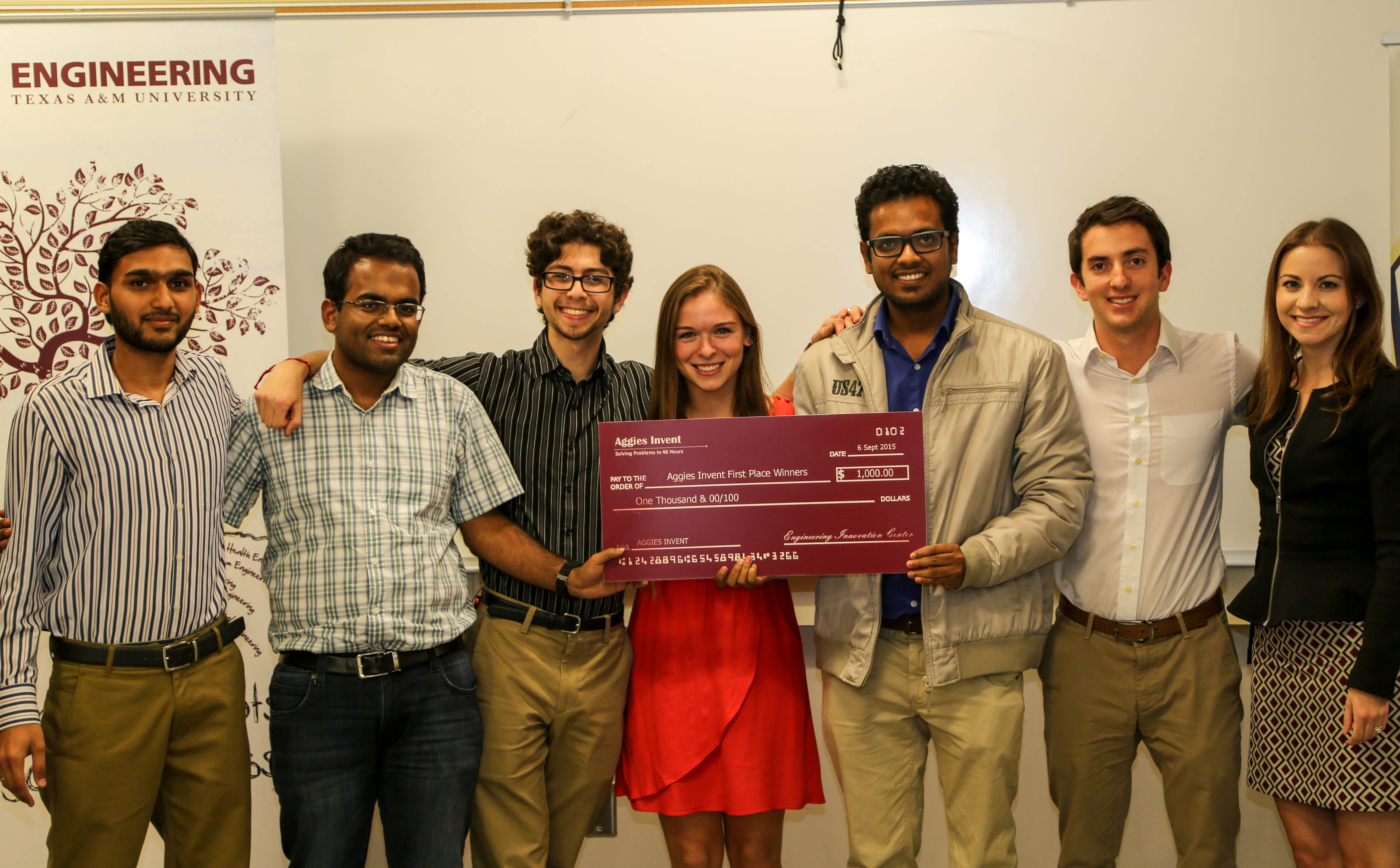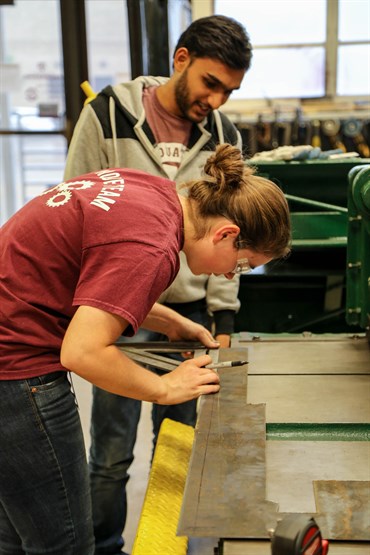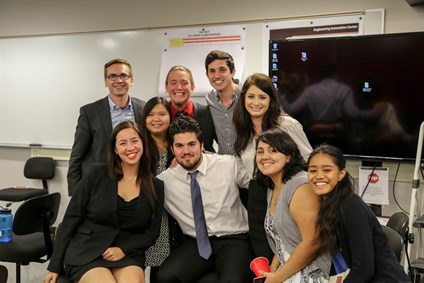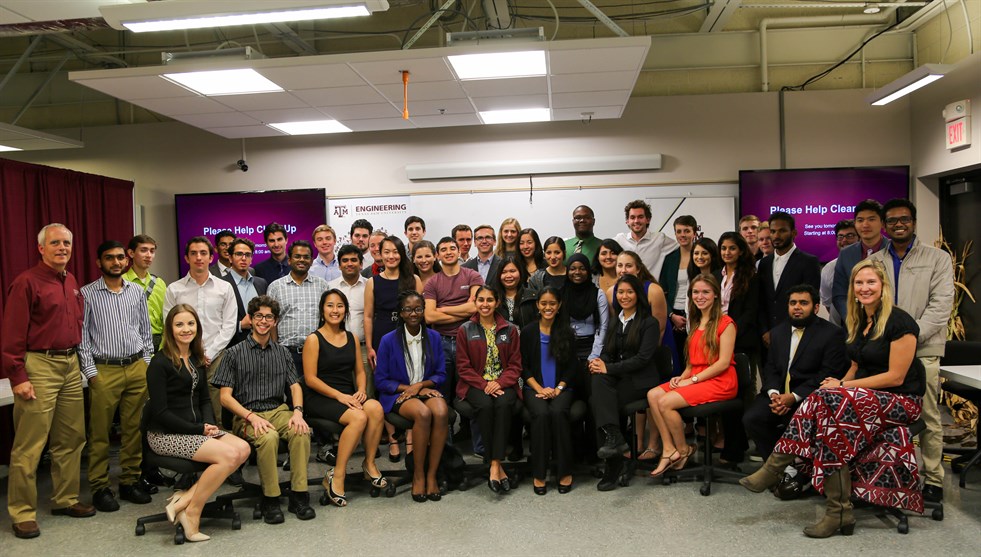
Guatemalan farmers could soon have a solution to deshelling their pigeon pea crops thanks to a mechanical device from Team Peas-Makers, which was awarded first prize and $1,000 at the most recent Aggies Invent competition held at Texas A&M University.
Aggies Invent promotes an innovation and entrepreneurial mindset among students at Texas A&M. It gathers interested students, provides them with the potential needs statements, allows them to self-select teams, gives them access to and support from the Engineering Innovation Center (EIC) and industry mentors to create prototypes in 48 hours.
The focus for this Aggies Invent was “Conflict, Development and Social Entrepreneurship,” and was sponsored by the Center on Conflict and Development at Texas A&M (ConDev). Issues presented included inefficiencies in shea nut and pigeon pea processing, human-elephant conflicts, millet processing, elephant darting systems and refugee survival packs. All the issues are those faced by people in Ghana, Botswana, the Democratic Republic of Congo (DRC) and Guatemala.
“I love the use of interdisciplinary problem solving and I think that’s when you come up with exceptionally novel concepts,” said Dr. Leslie Ruyle from ConDev, “I think the combination of everyone’s skillsets and thought processes is when you come up with the greatest solutions.”
 Team Peas-Makers met the needs of its Guatemalan community by improving the deshelling process of pigeon peas. Its mechanical crank is affordable, user-friendly and is less labor intensive. The pigeon peas are an excellent source of nutrition and also a very profitable crop for many families. The team was comprised of four engineering students, Mauricio Coen, Sujoy Saha, Daniel Schwartz, and Mumtaz Syed and two business students, Grace Evans and Vatsal Gupta.
Team Peas-Makers met the needs of its Guatemalan community by improving the deshelling process of pigeon peas. Its mechanical crank is affordable, user-friendly and is less labor intensive. The pigeon peas are an excellent source of nutrition and also a very profitable crop for many families. The team was comprised of four engineering students, Mauricio Coen, Sujoy Saha, Daniel Schwartz, and Mumtaz Syed and two business students, Grace Evans and Vatsal Gupta.
Second place and a $750 prize went to SHEAping the Future for its innovation on shortening the shea nut dehusking process. The “shea sheller” is a hand cranked pressure roller that gently cracks the shea nut shells to shorten the time women in Ghana spend cracking and dehusking shea nuts. The shea nuts can then be used or sold. The team was comprised of James Bunsen, Miguel Hoffmann, Connor Lyons, DanThi Vo, Amelia Min-Venditti and Gerardo Vasquez.
The Butter Solution team took third place and received $500 for its shea butter roaster. The team made modifications to the existing roaster to prevent shea butter from sticking to the roaster and to reduce the manual labor required in cranking the roaster. Selling shea butter is a good source of income for many women, but issues with the current roaster can lead to product waste. The team members included Lindsay Yankam Kontchou, Samantha Tachibana, Alec Ito and Jake Yturri.
The judging panel was so impressed by all the teams it added an honorable mention award with $250 to Team Seismic for its early warning system for elephants approaching the area. The team members were Ricci Seguban, Erika Elizondo and Ashley Kirsch.
“This event allows students to tackle a challenge that’s relevant and faced by people on the ground in different countries,” said Michelle L’Archeveque Jones from the US Agency for International Development (USAID). “Events like this recognize that students are a really important part to this equation.”

The panel of judges included Andrew Natsios, Bush School professor and former USAID administrator, Michelle L’Archeveque Jones, USAID program manager, Dr. Paul Schwab, professor in the Department of Soil and Crop Sciences, Dr. Jorge Vanegas, College of Architecture dean and Dr. Catharina Laporte, Department of Anthropology instructional professor.
This Aggies Invent brought more than 50 students together and included the highest rate of female students at 35 percent. Students commented on how this event was not just about the competition, it was about teamwork, learning new skills and learning about themselves. Freshmen engineering students said it was helping them decide which major they wanted to enter next year.
All teams were encouraged by the judges and by event organizers to keep working on their projects and develop them further. The students are encouraged to work in the EIC and with mentor, Rodney Boehm, associate professor of practice and industry mentor. They also have the opportunity to work with Startup Aggieland for additional assistance.
“I really hope that students participating will not just leave their prototype on the shelf, but will continue to work on them; I hope we’ll see them being field tested in the future,” said Michelle L’Archeveque Jones. “At USAID, we understand that good ideas can come from anywhere.”
